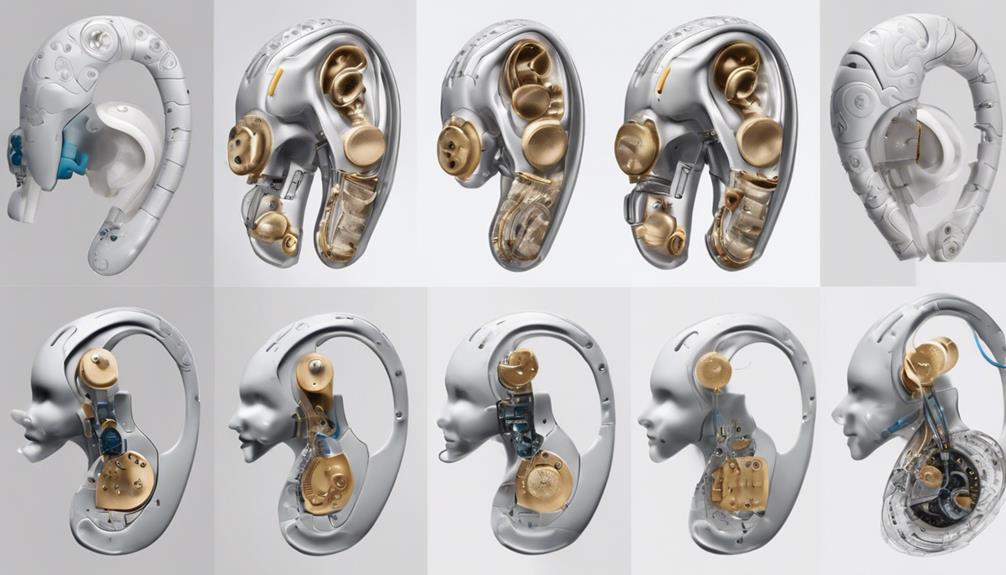As we delve into the intricate realm of cochlear implant costs in the United States, we find that financial considerations play a crucial role in accessing this technology.
The figures may surprise you, prompting a deeper exploration of the various components that contribute to the overall expenses associated with cochlear implants.
Understanding the nuances of insurance coverage, out-of-pocket expenses, and available assistance programs can shed light on the affordability and accessibility of this life-changing auditory solution.
Let's uncover the intricacies together.
Key Takeaways
- Cochlear implants in the US range from $50,000 to $100,000.
- Medicare covers 80% of cochlear implant costs.
- Patients may need to pay coinsurance, copays, or deductibles.
- Assistance programs are available for uninsured individuals.
Types of Cochlear Implants
When considering cochlear implants, individuals have the option to choose from different types offered by FDA-approved manufacturers in the US. Cochlear Americas, Med-El, and Advanced Bionics are the three main manufacturers providing unique cochlear implant technology.
Cochlear Americas specializes in the Nucleus System, known for its advanced signal processing capabilities. Med-El distinguishes itself with robust electrode arrays that enhance sound perception. On the other hand, Advanced Bionics offers the HiRes Ultra 3D Cochlear Implant System, which is renowned for its high-resolution sound quality.
Each manufacturer has its strengths and innovations, allowing patients to select the cochlear implant that best suits their individual requirements. The Nucleus System by Cochlear Americas, Med-El's electrode arrays and signal processing, and Advanced Bionics' HiRes Ultra 3D system provide diverse options for individuals seeking improved hearing through cochlear implant technology. By understanding the unique features of each manufacturer's offerings, individuals can make informed decisions tailored to their specific needs.
Average Cost and Factors

Moving on to the discussion of the average cost and factors associated with cochlear implants in the US, it is important to consider various financial aspects that can impact the overall expenses for individuals seeking this technology. The average total cost of cochlear implants in the US ranges from $50,000 to $100,000, with variations based on factors such as location, insurance coverage, and in-network providers. Patients may have financial responsibilities like coinsurance, copays, and deductibles, depending on their insurance plans. Assistance programs exist for those without insurance coverage to aid in covering the costs of cochlear implants. Understanding the details of insurance coverage is crucial for managing the financial aspects of cochlear implant surgery.
| Factors | Details |
|---|---|
| Insurance Coverage | Varied based on individual plans and may cover a portion of the cochlear implant costs. |
| Assistance Programs | Available for individuals without insurance coverage to help alleviate the financial burden. |
| In-Network Providers | Choosing providers within the insurance network can lead to lower out-of-pocket expenses for patients. |
| Deductible | Amount individuals must pay out of pocket before insurance coverage begins to contribute. |
| Financial Aspects | Understanding and planning for potential costs is essential in managing the expenses of cochlear implants. |
Medicare Coverage Details
Understanding how Medicare covers cochlear implants is crucial for individuals considering this form of hearing assistance. When it comes to Medicare coverage for cochlear implants, here are some key details to keep in mind:
- Medicare typically covers 80% of the cost of cochlear implants for eligible candidates.
- Beneficiaries are responsible for the remaining 20% of the cost under Medicare coverage.
- Medicare Supplement plans and Medicare Advantage plans can impact coverage details for cochlear implants.
- Over 90% of private insurance, Medicaid, and Veterans Administration help cover cochlear implant costs.
Having a clear understanding of how Medicare works in relation to cochlear implants is essential for managing the costs associated with this type of hearing assistance. It's important to explore all available options, including private insurance, Medicaid, and additional Medicare plans, to ensure comprehensive coverage for cochlear implants.
Payment Options and Considerations

Exploring various payment options and considerations for cochlear implants is essential for managing the substantial costs associated with this form of hearing assistance in the US.
The cost of a hearing implant can range from $50,000 to $100,000 per ear, making it crucial to understand the available financial assistance avenues. Health insurance, including private insurance, Medicare, and Medicaid, commonly offer coverage for cochlear implant expenses, although patients may still face coinsurance, copays, and deductibles based on their specific insurance plan.
For those without insurance coverage, assistance programs and financial aid options exist to help offset the high cost of cochlear implants. By thoroughly examining insurance coverage details and researching payment options, individuals can make informed decisions to alleviate the financial burden associated with acquiring a cochlear implant.
Being proactive in exploring these avenues can ensure that individuals in need of this technology can access it without undue financial strain.
Sources and References
Based on extensive research and expert opinions, numerous reliable sources and references provide valuable information on the cost, coverage options, and financial assistance programs related to cochlear implants in the United States.
- Health insurance plans, including private insurance and Medicare Advantage, often cover a significant portion of the costs associated with cochlear implants.
- Eligibility criteria for insurance coverage vary, with Medicare typically covering 80% of the cost for eligible candidates, leaving the individual responsible for the remaining 20%.
- Surgical fees for cochlear implantation can range from $50,000 to $100,000, depending on factors such as location, choice of surgical center, and insurance coverage.
- Various assistance programs exist to help individuals without insurance coverage offset the high costs of cochlear implants, ensuring that more people have access to this life-changing assistive hearing device.
Frequently Asked Questions
How Much Does It Cost to Get a Cochlear Implant With Medicare?
When getting a cochlear implant with Medicare, the cost usually involves Medicare covering 80% of the expenses. As beneficiaries, we're responsible for the remaining 20% of the cost.
To potentially reduce out-of-pocket expenses, considering supplemental Medigap policies is advisable. Additionally, Medicare Advantage plans offer various coverage options for cochlear implant costs.
Understanding these details is essential for individuals contemplating cochlear implant surgery.
Will Insurance Cover a Cochlear Implant?
Insurance coverage for cochlear implants varies based on the type of plan. Medicare typically covers 80% of costs for eligible candidates in the US, while private insurance, Medicaid, and Veterans Administration also provide coverage.
It's important to check with your insurance provider to understand specific benefits and costs associated with the surgery. Payment assistance programs and non-profit organizations can help individuals without insurance coverage for cochlear implants.
What Is the Rate of Cochlear Implant?
The rate of cochlear implantation varies depending on several factors, including the medical facility, surgeon expertise, and geographical location.
Typically, the procedure involves both surgical and post-operative care costs. These expenses encompass the surgical implantation of the device, anesthesia, hospital fees, follow-up appointments, and rehabilitation services.
Understanding these components can provide a clearer picture of the overall rate associated with cochlear implant surgery.
Does Obama Care Cover Cochlear Implants?
Absolutely!
Obamacare, or the Affordable Care Act, may cover cochlear implants. While not explicitly listed, the ACA mandates coverage for essential health services, potentially including cochlear implants. Insurance plans from the Health Insurance Marketplace under Obamacare might cover cochlear implants, depending on specific plan details and individual circumstances.
Exploring coverage options under Obamacare, including plan specifics and eligibility criteria, can help individuals seeking cochlear implants navigate potential insurance coverage.
Conclusion
In conclusion, the cost of cochlear implants in the US can vary greatly, with an average range of $50,000 to $100,000.
It's interesting to note that Medicare typically covers 80% of the costs for eligible candidates, leaving only 20% for the patient to cover.
Despite the high costs, there are payment options and assistance programs available to help make this life-changing technology more accessible to those in need.










